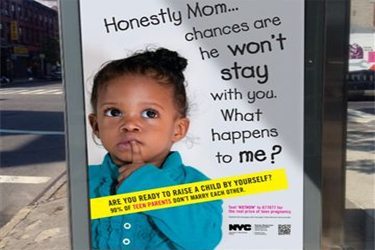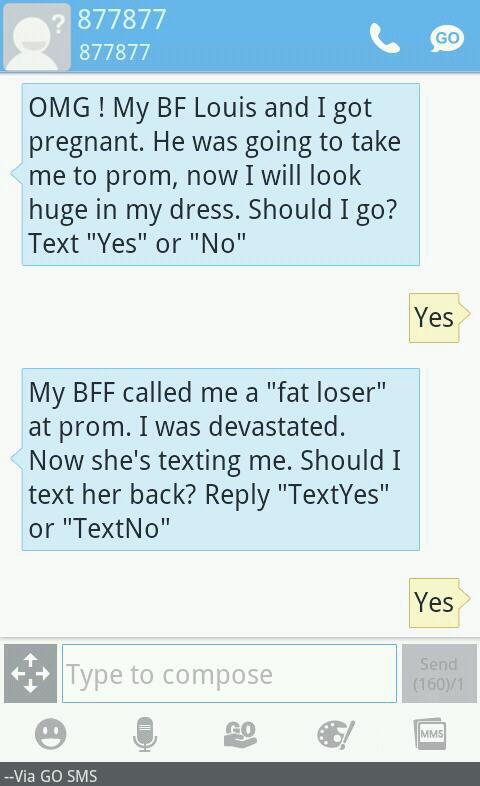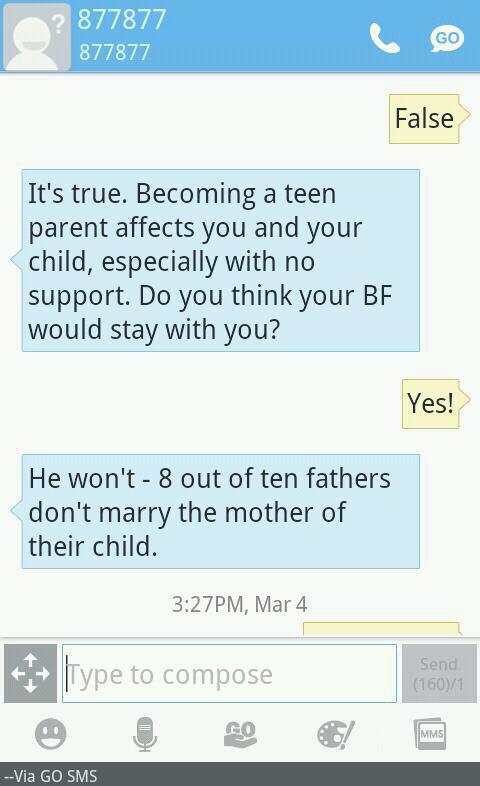NYC Teen Pregnancy Campaign Brings Shaming to Bus Shelters and Cell Phones
The New York Human Resource Administration's new teen pregnancy prevention campaign takes shame as a prevention tactic to an entirely new level.

The New York Human Resources Administration (HRA) launched a new ad campaign this week that takes the use of shame tactics to prevent teen pregnancy to a whole new level. The ads feature images of young children alongside messages to their would-be teen parents. It’s hard to describe the ads as anything but horrifying and yet another link in the chain of shame-based teen pregnancy prevention efforts.
It might be hard to believe, but there’s a component to the campaign that’s even worse than the ads. At the bottom of each ad is a message: “Text ‘NOTNOW’ to 877877 for the real cost of teen pregnancy.” I followed these instructions, and what resulted was a really screwy game of “choose your own adventure” via text message. First, the “game” asks you to pick either Louis or Anaya, the two characters you can follow. I chose Anaya, and this is the first response I received:
It only got worse, with more scenarios about Anaya being ignored by her “baby daddy” and shunned by her parents. None of the texts included any actual information for teens trying not to get pregnant—they just used an invented scenario to drive home the idea that teen pregnancy results in social isolation and losing your boyfriend. Below is the final text exchange in this version of the game. Just before, I was asked to respond “true or false” to the statement “Children of teen moms are MORE likely to drop out of school and not be able to make ends meet.”
The text you don’t see at the bottom is me replying, “That’s mean,” which got no response from the SMS bot.
Why the hell is the New York City government spending money on a system to tell young girls that their boyfriend will leave them if they get pregnant?
If you choose to follow Louis, the exchange is no better. The Louis version of the game offers even less practical information and further reinforces the idea that teen parents never stay together. Furthermore, like this ad, the Louis exchange emphasizes the financial consequences of child support.
I’m sick and tired of teen pregnancy prevention money being spent on these kinds of media stunts. Where is the proof that stigma actually leads to prevention? The messages sent by these ads and the ridiculous SMS game make it seem like the HRA is fine with the status quo of shame and isolation for teen parents. A pregnant teen gets called a “fat loser”? “Well, she shouldn’t have don’t pregnant!” the campaign seems to say. What kind of message does this send about bullying?
These ads put all of the responsibility on teens themselves and present avoiding pregnancy as a panacea that will solve all their problems. Meanwhile, the unemployment rate for youth today is staggering, even if they finish high school. Teen pregnancy is much more than a personal responsibility problem, but the campaign might as well be telling teens to pull themselves up by their bootstraps.
The campaign also assumes that teens don’t understand how difficult it is to be a teen parent, and that they choose to parent as teens naively. I give teens more credit than that. Take blogger Natasha Vianna’s experience:
When I was a teen, I knew how hard it was to be a teen mom because I saw it in my family and in families around me. My mom was a teen mom, my grandmother was a teen mom, my aunt was a teen mom, my cousin was a teen mom, and so many more. Yes, I saw girls drop out of school and struggle with many aspects of their lives. I didn’t need a lame ad with a picture of a crying baby (who of course had to resemble a minority) to tell me that. Yet, at 17, I still became a teen mom and it was NOT what I wanted for myself. I never thought to myself, “Ahhh yes, statistics say my kid would be twice as likely to not graduate than kids born to moms over 22. SO, I will have a baby now before 22 and accept the challenge.” So what makes you think most teens are going to think the opposite? Pregnancies are usually unplanned and accidental. These ads don’t prevent unplanned pregnancies.
If the HRA wants to spend money on a texting program for teens, why not give them information about how to prevent pregnancy, such as where to get condoms and information about birth control myths? This campaign is an appalling waste of government dollars that seems likely to have more negative effects on teen parents than positive effects on teen pregnancy rates. Natasha again:
It’s this very concept of shaming teen moms that drives us into a deeper hole of isolation. I didn’t want to tell anyone that I was a teen mom, I didn’t want to ask for help, I refused to apply for any aid, and I put myself in unhealthy situations so I wouldn’t have to face the judgment of others. It was horrible. Yet, no one ever bothered to talk to me about the occurences in my life that led up to my pregnancy. Or what my life was like before becoming a pregnant teen. No one knew that I was already depressed in high school. No one knew that I already faced many of the adversities that teen moms face too. My life may have been exactly the same if I hadn’t become a teen mom but no one cared to look at me until there was a baby involved (that no one really cared about either).
The timing of this campaign is interesting, considering that data from 2008 was just released indicating that teen pregnancy rates are continuing their decline in most states, including New York. And what’s credited with this ongoing decline in teen pregnancy rates? Not perpetuating stigma or shame, but increased contraceptive use.



